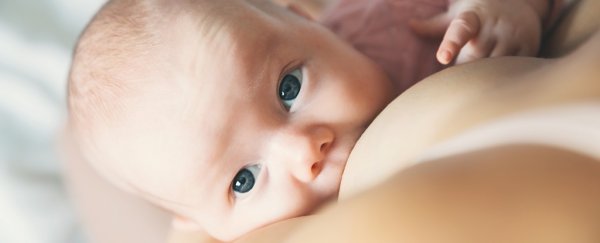Pot is more available than ever. In the US, it's legal for recreational use in nine states (plus Washington, DC) and has the green light for medical use in some 30 across the country.
That ease of access fuels uptake – including by pregnant women, whose usage, in California at least, has almost doubled since 2009. At the same time, the drug's high is also higher than ever. What is all of this doing to babies?
The truth is, we don't really know. Due to a lack of scientific data – largely thanks to marijuana's history as a Schedule 1 drug – there's a lot we don't understand about the effect maternal usage may have on infants, if any.
But a new study tells us something important about how tetrahydrocannabinol (THC) – the drug's primary psychoactive component – could be unintentionally delivered to babies: via breast milk.
"Paediatricians are often put into a challenging situation when a breastfeeding mother asks about the safety of marijuana use," explains paediatrician Christina Chambers from UC San Diego.
"We don't have strong, published data to support advising against use of marijuana while breastfeeding, and if women feel they have to choose, we run the risk of them deciding to stop breastfeeding – something we know is hugely beneficial for both mum and baby."
That decision might not be any easier to make now, but at least we have a crucial new insight thanks to Chambers' new research.
Her team took samples of breast milk from 50 breastfeeding women who reported marijuana use – either daily, weekly, or sporadically – and analysed the contents to see what kind of THC payload was present.
In more than half the samples (63 percent), the psychoactive compound remained for up to six days after the mother's last reported use.
Again, we don't really know what the potential effects of this THC persistence might be on babies, but the fact that the active component of this highly prevalent medical and recreational drug can last so long in breast milk is cause for concern, scientists say.
"There's a myth out there that it's benign," paediatrician Seth Ammerman from Stanford University, who wasn't involved in the study (but who co-authored a related article in the same journal this month), explained to the Los Angeles Times.
"And for many adults who are sporadic users, that's probably true … [but] it may be harmful."
While we don't know what the harm would be, Chambers and her co-authors suggest in their paper it is "reasonable to speculate that [THC] or cannabidiol exposure during breastfeeding, depending on the dose and timing, could influence normal brain development of a child".
Until we know more, the American Academy of Paediatrics' newly revised recommendations state: "[M]aternal marijuana use while breastfeeding is discouraged. Because the potential risks of infant exposure to marijuana metabolites are unknown, women should be informed of the potential risk of exposure during lactation and encouraged to abstain from using any marijuana products while breastfeeding".
That's something to bear in mind, at a time when it seems a lot of the science, law, and culture around marijuana usage is in a state of rampant flux.
"A lot of the public equates legalisation with some kind of endorsement of safety," obstetrician Dana Gossett from UC San Francisco, who wasn't involved with either study, told the Los Angeles Times.
"Of course, that's not true. Just because something is plant-based or natural doesn't make it safe."
The findings are reported in Pediatrics.
